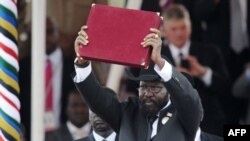Prior to South Sudan’s independence in 2011, the international community funded several humanitarian and development projects in the region but after fighting broke out in late 2013, many partners slashed funding for programs.
Some countries, including the United States, imposed sanctions on South Sudanese individuals accused of blocking peace in the country. So far, those efforts have yielded spotty results.
Jok Madut Jok, a South Sudanese political analyst and lecturer at University of Syracuse in New York, says blaming the international community for South Sudan's problems is not the answer.
“No matter how much international good will, no matter how much money is poured in from outside, no matter the diplomatic pressures, the reality is that no one can solve the problems of South Sudan except the South Sudanese themselves. All that the world can do is facilitate, pay and support, provide expertise, but the will to solve the problems of South Sudan is needed to come from the South Sudanese leadership itself,” Jok told South Sudan in Focus.
The leaders who should have put South Sudan on the right track are the same people who caused the economic and political crisis in the country, said Jok, adding the euphoria people felt in 2011 vanished almost immediately when leaders failed to build a cohesive nation.
“Due to that failure, political disunity kicked in prominently soon after independence and perhaps even dating back to the days of the struggle for independence. This was not addressed following the ushering in of a new state. The second is failure to manage the resources of the country for the benefit of all,” Jok told VOA.
South Sudan’s birth largely depended on efforts of the international community.
The Comprehensive Peace Agreement signed in 2005 between the then-semi-autonomous region of Southern Sudan and Sudan, which led to the country’s independence, was facilitated by the international community.
South Sudan's friends have seemed to abandoned their role of backing the implementation of the peace agreement, said Peter Lomude Francis, a senior member of the National Democratic Movement and signatory to the deal.
“The guarantors are not playing their part. The IGAD (Intergovernmental Authority on Development) that is supposed to appoint the chairperson of RJMEC (Reconstituted Joint Monitoring and Evaluation Commission), up to today RJMEC continued to be headed by an interim chair. We feel that they should also live [up] to their mandate and they should help the people of South Sudan move forward,” Lomude told South Sudan in Focus.
South Sudan's leaders are to blame for not staying true to their word, not the international community, said Jok.
“People are marginalized and excluded from the gains of independence. It is all these things, the inequality, the ghastly disparities that have been produced among the people of South Sudan by the kind of leadership and party-capitalist system, the primitive accumulation of resources in the hands of a few people to the exclusion of the vast majority of the people; those are fundamental causes of conflicts in this country,” argued Jok.
Nicholas Haysom, the United Nations special representative of the secretary-general in South Sudan, said at a recent event in Juba the country needs national leadership to transition to peace and stability and hold elections slated for next year.
“I call on all parties to demonstrate a collective common purpose, unity of purpose by working together towards the full implementation of the agreement. I urge all the leaders to take all the necessary steps for the country to exit its transitional period through the conduct of free, fair, credible and peaceful elections,” said Haysom.
South Sudan has yet to set an election date as international pressure for a timetable mounts.




